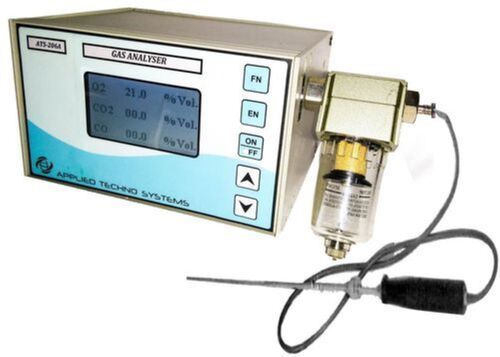- Dew Point Meters
- Gas Analysers
- Portable Gas Detector
- Moisture And Dew Point Analyzer
- Dust Monitor
- Gas Monitoring Systems
- Gas Leak Detectors
- Gas Transmitters
- VOC Leak Detector
- Air Quality Monitoring System
- Online Continuous Emission Monitoring System-OCEMS
- Dew Point Monitors
- Gas Detector
- Opacity Monitor
- Portable Flue Gas Analyzer
- Online SOX & NOX Gas Analyzer
- Methane Gas Leak Detector
- Hydrogen Purity Analyzer
- Gas Purity Analyzer
- Effluent Monitoring Systems
- Producer Gas Analyzer
- Gas Detector Calibration Service
- Portable Gas Monitors
- Gas Sensor Transmitter
Combustion Gas Analyzer
Product Details:
Combustion Gas Analyzer Price And Quantity
- 1 Unit
- 158000 INR/Unit
Combustion Gas Analyzer Trade Information
- Cash Advance (CA) Cash in Advance (CID)
- 1000 Unit Per Week
- 2 Days
- Asia Australia Central America North America South America Eastern Europe Western Europe Middle East Africa
- All India South India Central India West India North India East India Gujarat Karnataka Kerala Lakshadweep Mizoram Meghalaya Manipur Andhra Pradesh Bihar Chandigarh Daman and Diu Goa Jharkhand Odisha Punjab Assam Delhi Dadra and Nagar Haveli Andaman and Nicobar Islands Arunachal Pradesh Chhattisgarh Haryana Himachal Pradesh Jammu and Kashmir Madhya Pradesh Maharashtra Nagaland Rajasthan Sikkim Tamil Nadu Telangana Tripura Pondicherry Uttar Pradesh Uttarakhand West Bengal
Product Description
A combustion gas analyzer is a device used to measure the concentration of gases produced during the combustion process in boilers, furnaces, and engines. These analyzers monitor emissions of gases such as oxygen (O2), carbon dioxide (CO2), carbon monoxide (CO), nitrogen oxides (NOx), and sulfur dioxide (SO2) to ensure optimal combustion efficiency, safety, and environmental compliance.
Combustion gas analyzers are widely used in industries like power generation, manufacturing, automotive, and HVAC systems. They are critical for reducing fuel consumption, optimizing energy use, and controlling pollution. Most analyzers are equipped with sensors and provide real-time data that allows operators to adjust combustion parameters.
Key Features:
- Multi-gas detection: Monitors various gases such as CO, CO2, O2, NOx, and SO2.
- Portability: Many models are handheld, making them suitable for field use.
- Data logging: Records data for later analysis and reporting.
- Real-time measurement: Provides instant feedback on combustion efficiency.
- User interface: Displays information clearly, often with touchscreens or buttons for ease of use.
Frequently Asked Questions (FAQs)
-
What gases does a combustion gas analyzer measure?
- Most combustion gas analyzers measure oxygen (O2), carbon dioxide (CO2), carbon monoxide (CO), nitrogen oxides (NOx), and sulfur dioxide (SO2). Some models may also detect unburned hydrocarbons or methane.
-
Why is a combustion gas analyzer important?
- It helps optimize combustion efficiency by ensuring the proper air-fuel ratio, thereby improving fuel economy, reducing emissions, and maintaining compliance with environmental regulations. It also helps prevent the release of harmful gases that can lead to safety hazards or regulatory fines.
-
How does a combustion gas analyzer work?
- The analyzer uses sensors to measure the concentration of various gases in the exhaust or flue gas. For example, electrochemical sensors detect oxygen levels, while infrared or chemical sensors measure CO and CO2 concentrations. The readings help operators adjust the combustion process for better efficiency and reduced emissions.
-
What industries use combustion gas analyzers?
- Combustion gas analyzers are used in power plants, oil and gas refineries, automotive industries, HVAC systems, manufacturing plants, and other sectors where fuel combustion occurs.
-
How often should a combustion gas analyzer be calibrated?
- It depends on the frequency of use and the model, but typically, combustion gas analyzers should be calibrated every 6 to 12 months to ensure accurate readings. Some analyzers may require more frequent calibration based on operating conditions.
-
Can combustion gas analyzers detect gas leaks?
- While combustion gas analyzers primarily measure emissions, some models may have features that help detect gas leaks, especially for flammable gases like methane. However, dedicated leak detectors are more effective for this purpose.
-
What is the difference between a combustion analyzer and a flue gas analyzer?
- A combustion analyzer focuses on optimizing the combustion process by measuring the concentration of gases like O2, CO, and CO2 in the combustion chamber. A flue gas analyzer measures the composition of gases in the exhaust flue, typically monitoring emissions from the entire system.
-
How long does a combustion gas analyzer last?
- With proper maintenance and regular calibration, a high-quality combustion gas analyzer can last several years. However, sensor life can vary and may need replacement depending on usage and the operating environment.
-
Are combustion gas analyzers portable?
- Many models are designed for portability, allowing users to take measurements in various locations. These handheld models are often used for HVAC maintenance and field testing.
-
How can I ensure accurate readings from my combustion gas analyzer?
- Regular calibration, proper sensor maintenance, and following the manufacturer™s guidelines for use and storage can ensure accurate readings. It™s also important to check for sensor degradation over time







 English
English Spanish
Spanish French
French German
German Italian
Italian Chinese (Simplified)
Chinese (Simplified) Japanese
Japanese Korean
Korean Arabic
Arabic Portuguese
Portuguese